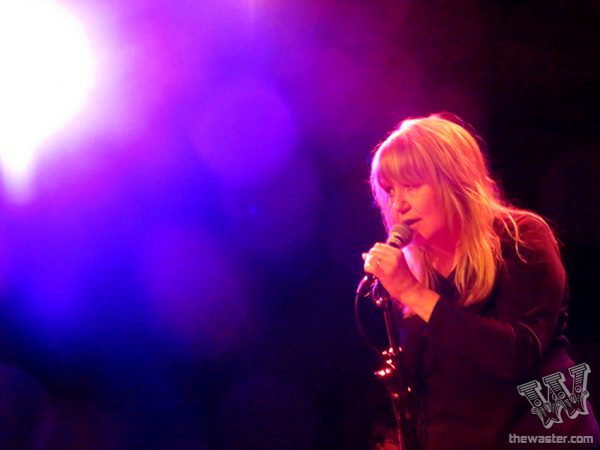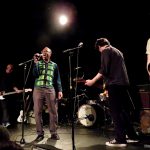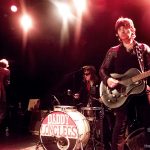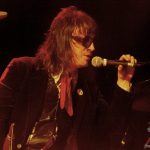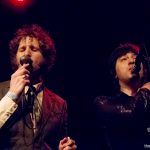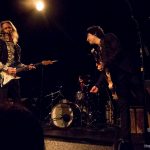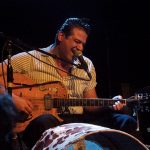Words by Roger Weisman | Photos by Kika Cori
“Billy Miller Forever!”
It wasn’t just the name of the show. It was the rallying cry that was shouted from the stage dozens of times throughout the night when last Saturday, The Music Hall of Williamsburg was home to The Billy Miller Forever Memorial Celebration. Paying tribute to the rock n’ roll historian and archivist who passed away on November 13th of last year, the concert featured numerous artists running the gamut of Americana and rock music.
Miller was the co-founder of Norton Records, along with his wife, musician Miriam Linna. The label’s focus on unearthing obscure recordings by forgotten rockabilly, blues, and garage rock artists earned admiration from rock collectors. His support and mentorship of younger artists who were reinvigorating and reinventing those genres made him a beloved figure in the New York music scene.
It was a loose and raucous affair, a meeting of old friends, an evening of the rough-and-tumble, fiercely individualistic music that he cherished and promoted. There was no lack of stories and reminiscences by friends and accomplices, and while often emotional, the evening never became maudlin.
Taking the stage, the evening’s emcee, Lenny Kaye, quoted Allan Ginsburg to provide the evening’s opening incantation: “Light a candle and continue the dance.”
There could not have been a better choice for emcee than Kaye. Both as a prominent figure on the early New York punk scene, and as another one of rock’s great curators and historians, he respectfully represented Billy in absentia, as both a personification of the New York punk ethos, and as an obsessive explorer and documentarian of culture. He lightened the mood with his fanciful description of the “greatest record collector” arriving in heaven announcing to gods and angels that “he has something that he wants you to hear.”
The first act of the night was “Canada’s One Man Band,” Bloodshot Bill, who unleashed a primal, beastly brand of rockabilly. Sitting barefoot with his guitar behind a bass drum and high-hat, he pummeled out a relentless beat to accompany his brutal strums. A vocal freak of nature, he deftly switched between a menacing growl and a gasping lonesome highway yodel from line to line, virtually acting as his own backup singer, performing a schizophrenic duet. Equally startling visually, his face glistened with sweat and as he pummeled and licked his beat-up guitar, while the lights bouncing off of his pomaded coif gave him a eerie blue aura, perfect for the image of a moonshine-drunk, backwoods Beelzebub.
Next to take the stage were The Condo Fucks, which is to say indie-rockers Yo La Tengo, utilizing an old alter-ego in order to indulge in a spirited excursion into straight ahead rock n’ roll. Bassist James McNew got a thick, punchy sound strumming his Fender VI (an instrument which could be better described as a low guitar rather than a six string bass, and was a favorite instrument of The Band’s Rick Danko and Peter Green of Fleetwood Mac). As the band’s short set went on, the trio’s sound became more aggressive, with front-man Ira Kaplan becoming increasingly physical, shaking violent sounds out of his guitar.
In sharp contrast, Dictators bassist and songwriter Andy Shernoff then sauntered onto the stage, acoustic guitar in hand. “They said, ‘Do you want to play with a band?” I said ‘no. I want to make my own personal statement.’”
His solo performance of “Who Will Save Rock and Roll?” unified the room. The laughter and applause arising from the lyric “I wish Sgt. Pepper never taught the band to play” was enough to inform even the most clueless observer that this audience of original punks, rockabilly boys, and Bettie Page look-alikes might not all be Beatlemaniacs. Joined by a full band consisting of The A-Bones and members of Daddy Long Legs, he concluded his mini-set with the Sam the Sham classic, “Wooly Bully.” Introducing it as “one of Billy’s favorite songs,” the loose, anarchic rendition had the audience screaming along.
Throughout the night, the artists would pay tribute through their choices of songs, adapting the lyrics to fit their own thoughts. It was in this spirit that music historian and WFMU DJ, The Great Gaylord, also backed by the A-Bones, barreled through a set of classic rhythm and blues. “We don’t mourn when people move on. We create a disturbance in people’s minds,” he declared before breaking into the old Jessie Hill song “Ooh Poo Pah Doo.”
Bringing the show back into the garage, Lenny Kaye’s set had him accompanied by drummer Josh Styles and guitarist Murat Aktürk, both of Daddy Long Legs, along with bassist Danny Goldstein. After a few personal Billy Miller stories, with not a few in-jokes thrown in, the group performed “Crazy Like a Fox,” a 1966 single that Lenny released under the name Link Cromwell and which fell quickly into obscurity. “If that had been hit in 1966, my life would have been completely different,” he mused.
Probably true. If he had found instant success instead of watching his single disappear from the charts and history, would he have been so intent to search out and preserve the efforts of the cult acts and one-hit wonders? Maybe he might have been too busy being successful to recognize the need for curated archival releases like his own production, the original Nuggets album, the classic 1972 compilation on which he brought together dozens of 45s of raw and insistent garage and proto-psychedelic rock.
It was easy to see from Lenny’s ruminations how he and Billy had been such kindred spirits. Both were obsessive collectors, both intent on searching for the rare and historical, both focused on finding connections and context in music and culture. But whereas the collector side of the consciousness often wants to hoard, the musician side of both of these men wanted the music to be out in the world. Gazing upward, Lenny said to his late friend: “You loved the music so much and you wanted it to be heard. And that’s what it’s all about.”
With that, he broke into “Gloria,” declaring it “the national anthem of garage rock” and demanding that the audience sing along. After a couple verses, he brought the band down behind him and commenced with a monologue describing, in early 60s teenage opera style, a romanticized version of the initial meeting of Billy and his wife Miriam, the romance that resulted in artistic collaborations, including numerous bands and publishing endeavors before the pair founded Norton in 1986. Kaye then led the audience in the last choruses, reworking the song around her, chanting M-I-R-I-A-M (as luck would have it, “Miriam” and “Gloria” have the same number of letters).
It was not surprising, then, that the most affecting moment of the evening was Miriam’s own set. Lyrically, the songs were teenage ballads of love and loss, mostly 1960s rarities, which she had performed and recorded for years. “I never knew anything about heartache and heartbreak, because I was married to the most perfect guy in the world.”
Her performances of songs like the Del Shannon deep cut, “My Love Has Gone” were acute and deeply moving, as if she were learning the real meaning of the words as she was singing them. She imbued the songs of adolescent heartbreak with maturity and honesty.
The next hour would be a loose assembly of guests backed by the evening’s house band. Various vocalists jumped in including Mick Collins of the Detroit garage bands The Gories and The Dirtbombs, Peter Zaremba of the Fleshtones, and Roy Loney of the power pop pioneers Flamin’ Groovies, all performing songs by their respective bands.
As it approached midnight, the band Daddy Long Legs took to the stage and launched into their set. One of the younger bands on the Norton Records roster, Daddy Long Legs (eponymously named for their lead singer and harmonica player), played a raunchy brand of blues infused with punk energy, providing some of the most visceral moments of the evening. Utilizing a lean, minimal instrumentation, with the vocals and harmonica backed by guitar and a stripped back drum kit, any possible harmonic gaps were filled in with sheer volume. They cut a mean image onstage as well, with drummer Styles and guitarist Aktürk dressed like a pair of Carnaby Street grifters while Daddy Long Legs himself stalked the stage, tall and lean, like an old west street preacher who also has some snake oil to sell you. They bashed their way through their set of original songs from their Norton LPs in a performance that mixed Americana and pure hooliganism.
At first, the inclusion of the 5.6.7.8s seemed slightly incongruous. After all, the Japanese trio was introduced to American audiences through their appearance in the Quentin Tarantino film, Kill Bill: Vol. 1. As the bee-hive hairdo wearing girl-group playing American music in a Tokyo nightclub, they were seen performing garage-surf rock songs like “I Walk Like Jayne Mansfield” and “Woo-Hoo.” Consequently, it can be argued that, to most of the American audience, the group has had an aura of novelty and kitsch. As the group kicked into their set of ragged, but loving takes on early American rock n’ roll songs, it became evident just how such dismissal was blatantly unfair (and probably sexist, if we’re going to be honest), and why they felt it so important to come all the way from Japan to celebrate Billy’s life and life’s work.
There’s just something about the ability to find a hint of oneself in a rare record, to discover an affinity for something outside of yourself, and thus to realize that’s one’s identity is not predetermined by one’s immediate surroundings. A good record can make you feel like you’re not in Kansas anymore… Or at least to remind you that you don’t have to stay there. That point was driven home when Bloodshot Bill, joined them on vocals. The Canadian rockabilly singer backed by a trio of Japanese surf-rockers was an odd sight that was immensely satisfying.
Closing the show was Memphis based band, Reigning Sound. Led by guitarist and songwriter Greg Cartwright, they played their punchy, propulsive brand of straight-ahead rock, mixing elements of garage and r&b and putting it across with a direct, workmanlike attitude. Looking back through the evening, one could see how many of the artists shared so many of the same ingredients, and yet how endless the permutations can be.
It was a joyous and profound celebration of a man who celebrated music, and it truly felt like a roomful of friends. However, for those in the room who did not know him personally, it still seemed as though a vivid portrait of him emerged. This was a man who made it his life’s work to bring back voices from the past, and bring voices from the present forward. In the digital age, his company pressed 45s. In a cultural landscape in which image and posturing rule, he sought the vital, the integral, and the genuinely impactful. In a big city, he knew how music could create community, and that’s a pretty good thing. So as long as people still scour yard sales for old vinyl, as long as friends drop by unannounced and proclaim “dude, you gotta hear this,” and as long as there are people seeking out the elusive, the rare, and the honest, Billy Miller lives forever.
www.billymillerforever.com
TheWaster.com | Brooklyn
5.04.17


